Farming
The purpose of these pages is to give information to the public at large about action being taken to reduce the carbon footprint of agriculture. With a greater understanding of the issues involved, we can support our farmers and exert our influence by changing our buying habits to reduce the carbon footprint of the food we buy.
Farmers are deluged with regulations and advice. This site will not attempt to match this.
Some sources are: Catchment Sensitive Farming: Government advice for farmers and land managers on how to get help to improve water and air quality and reduce flood risk on agricultural land. British Soil Society Videos: Zoom into Soil: Regenerative Agriculture; Zoom into Soil: Using Data to Improve Sustainability.
The Problem
Industrial animal farming releases as much greenhouse gasses as all cars, trains, ships and planes combined. Here’s the climate impact of the foods we eat. There is no time towait!
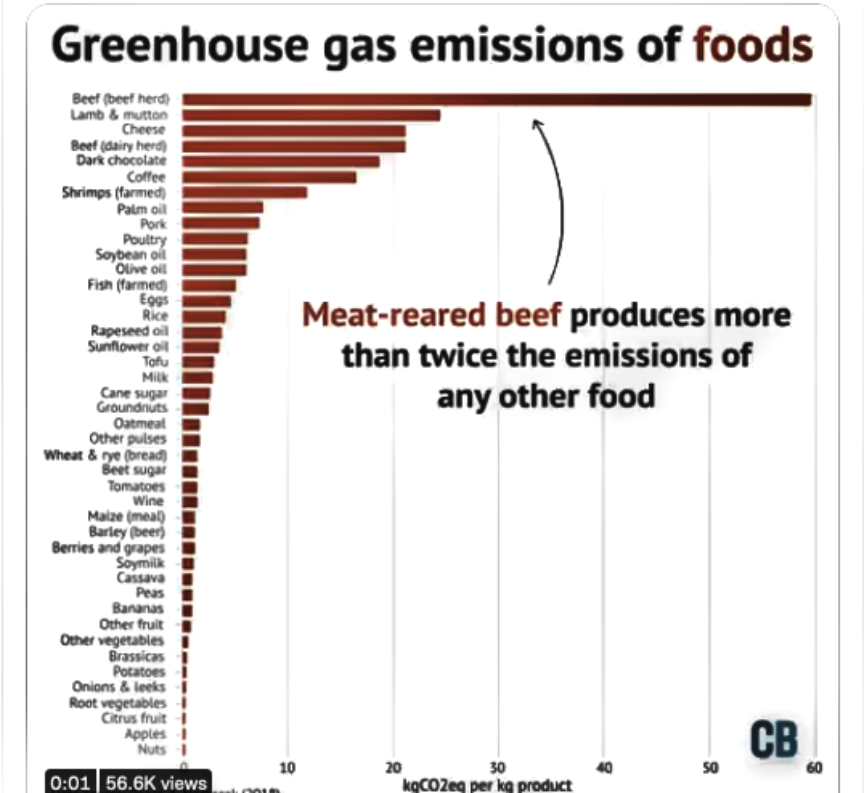
The Solution
Regeneative Soil Management
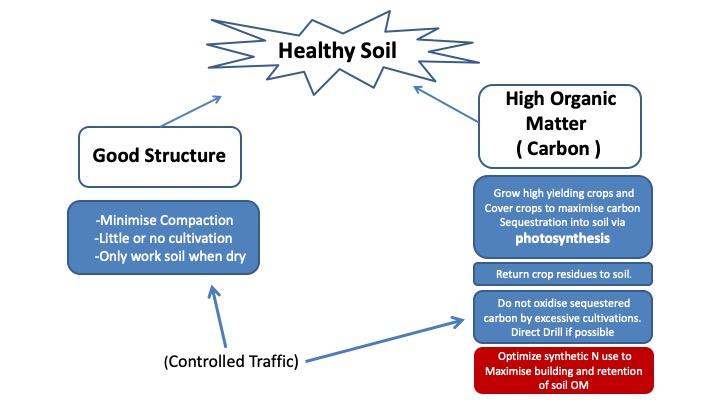
Winter Crops
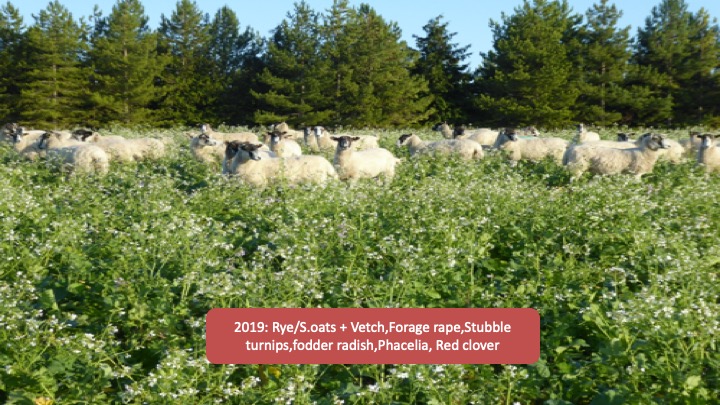
The primary aim is to grow big high yielding crops that are photosynthesising hard and also to grow cover crops wherever possible between winter and spring crops to keep root exudates. The strategy is to use reduced or no till (and direct drill) whenever possible – to minimise cultivations, and to return all the crop residues where possible. They run a 10m controlled traffic system which has reduced trafficking of the soil to 20%. Julian Gould, the Farm Manager describes his motivation. “I really see myself not as a farmer but more as a photosynthesis facilitator – I basically want to take as much carbon out of the air as I can and put it in my soils.”
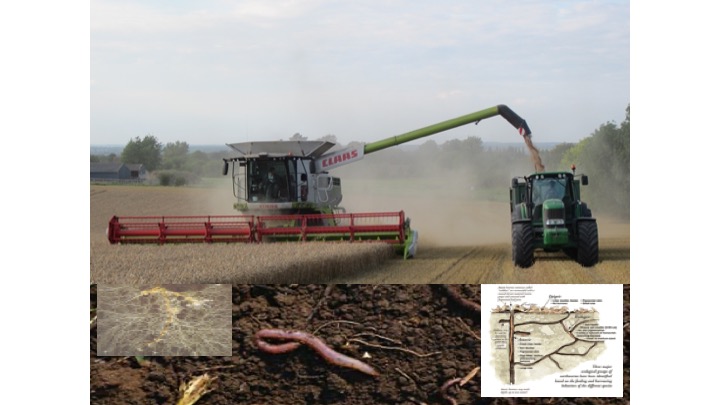
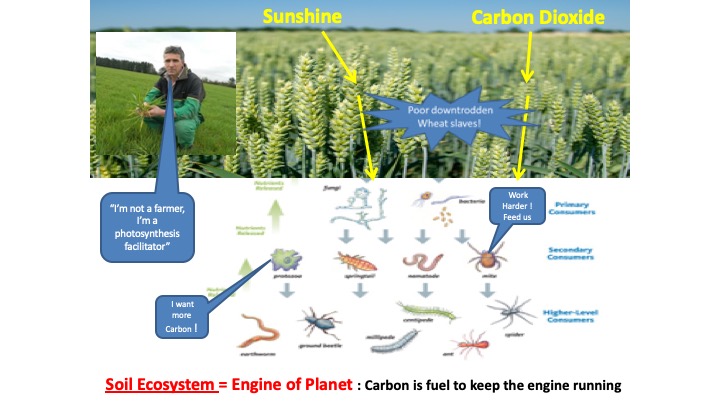
Farm Clusters in Oxfordshire
Farmer Clusters Farmers and land managers do a lot for Britain’s rural environment, but there is only so much that an individual, acting in isolation, can achieve on their own. By working together, helped by an advisor or ‘facilitator’, farmers and land managers can work more cohesively together in their locality. This enables them to collectively deliver greater benefits for soil, water and wildlife at a landscape scale.
The North East Cotswold Farmers Cluster. A group of farmers and landowners in the Northeast Cotswolds, who have got together with a plan to work and learn together to enhance the natural capital on the land, tackle the climate emergency and build more resilient food and farming businesses. Together they farm land stretching from the A40 in the South, northwards to Moreton-in-Marsh, and eastwards to Chipping Norton and Woodstock. To date they have 109 farms covering 34,244 hectares in the group.
Christmas Common. Christmas Common farmers manage a range of natural, historical and cultural assets comprising a large area of the south western end of the Chilterns AONB and surrounding landscape. It includes the Hambledon River Valley, and its chalk stream the Hamble Brook, along with woodlands and arable fields interspersed with commons, villages, scattered farmsteads and designed parklands all associated with the plateau and dipslope. Their emphasis is on creating a pollinator network and connecting habitat across a cross section of the Chilterns. They are looking at wood, hedge, pond and grassland management, margin and flower rich plot establishment and management. They will identify opportunities for restoration and creation in order to restore a functioning ecological network. Best practice such as Integrated Pest Management will benefit pollinators and help improve water quality.
Advice on Nature Friendly Farming
There is a wealth of information available on how to support wildlife on farmland. Here are some of the online resources that offer practical support and guidance if you’re interested in finding out more https://www.nffn.org.uk/resources.
NFFN’s Practical Guide to Climate Action for UK Farmers, Rethink Farming: A Practical Guide for Farming, Nature and Climate, Nature Means Business: Establishing the Balance Between Food Production and Improving Nature, Feeding The Nation: How Nature Friendly Farmers Are Responding To Covid-19, Farming For Our Future: The Nature Friendly Climate Change Solution We Urgently Need, Nature Friendly Farming: The Future of Farming in the UK.
The Nature Friendly Farming Network report ‘Rethink Food’ emphasises the need for change. The report maps the legacy of our food system’s past and presents the case for why we need a monumental change in how we farm our land and feed our nations.
The Nature Friendly Farming Network report ‘Rethink Farming’ It is increasingly apparent is how the role of farmers, crofters and land managers must evolve to one that urgently delivers on nature recovery and climate mitigation, alongside producing healthy and nutritious food. The report offers a series of solutions in areas where farming can strengthen adaptation and build resilience to climate impacts. The actions presented in this report highlight how nature-based solutions can help elevate our climate and biodiversity ambitions in seven areas where farming is integral: Soil, Water, Biodiversity, Carbon Management, Landscape Approaches, Food Quality and Prosperity.
The North Wessex Downs Area of Outstanding Natural Beauty sponsors a number of farming webinars at https://www.northwessexdowns.org.uk/farming/webinars/. Farmland birds, reversing the decline; Behind the scenes of a farm cluster, Introduction to Natural Capital on Your Farm, Getting to Know Your Soils, The Future Role of Hedges
